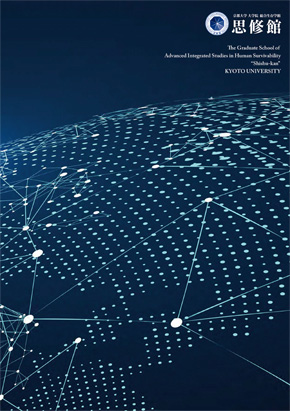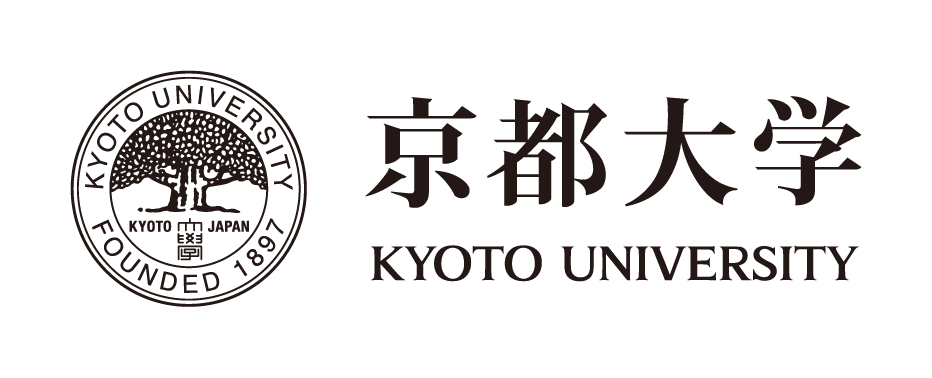The Kyoto University International Spring School for Future Global Leaders Program Articles.
The Kyoto University International Spring School for Future Global Leaders aims to provide students from inside and outside Japan with an opportunity to learn about global leadership in Kyoto. The program helps the students to develop the capacity to synthesize knowledge from humanities and sciences and gain experience in tackling complex social problems through the core curriculum of the GSAIS, which includes lectures on integrated academic foundations, cultural practices as well as discussions and workshops on leadership, which will feature Kyoto as an example of a global leader in order to deepen understanding on leadership through the School.
| 6th March | 7th March | 8th March | 9th March |
| 10th March | 11th March | 12th March | 13th March |
| 14th March | 15th March | 16th March |
Spring School Program News Article, 16th March
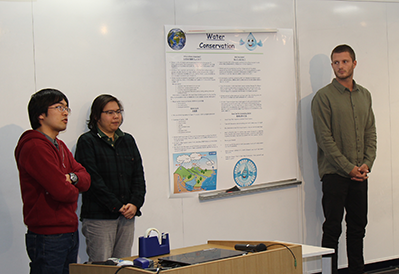
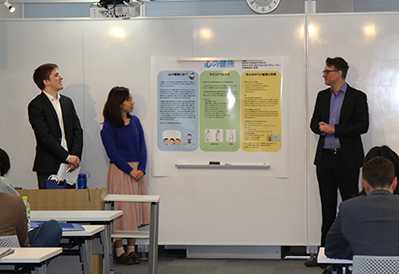
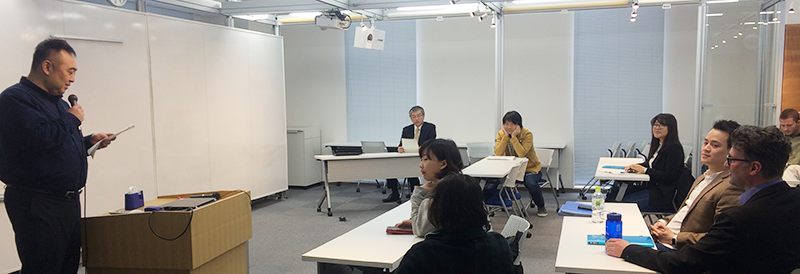
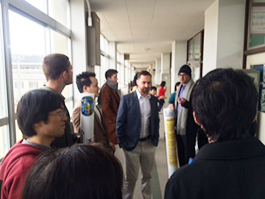
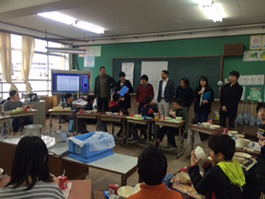
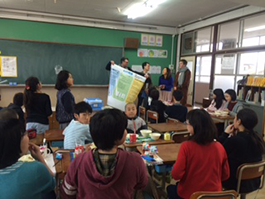
Our final day of the Kyoto University International Spring School for Future Global Leaders commenced with a meeting with all the participants, professors and the vice dean Yuichi Ikeda. Each group briefly described their workshop from the previous days followed by a conclusion for the past two weeks summing up their impressions and experience gained, especially related to leadership. There was a lively discussion among the participants and thoughtful questions of the vice dean who studies physics but nonetheless emphasized the importance of leadership. The small session was closed by final words of Professor Yamashiki wishing everybody to keep in touch for the future and giving the students the opportunity to further deepen the studies at the Kyoto University.
We were offered a lovely farewell party shortly after where food and drinks were shared in a relaxed atmosphere and more detailed discussion about the gained experience and knowledge was possible.
Afterwards, we paid a short visit at the Daiyon-Kinrin primary school to hand over our learning material for the upcoming school year of the students. It was our first time visiting a primary school and we got an impression of early Japanese education and the tradition of having lunch together in the classroom.
All in all, the last day was a great summary of our stay in Kyoto combining lectures about leadership and human survivability marked by discussions and different opinions with Japanese culture. We are grateful for this wonderful week and sincerely hope for further meetings in the future.
Nguyen Duc Binh Benno
Leibniz University Hannover
Spring School Program News Article, 15th March
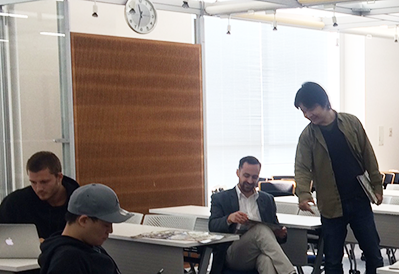
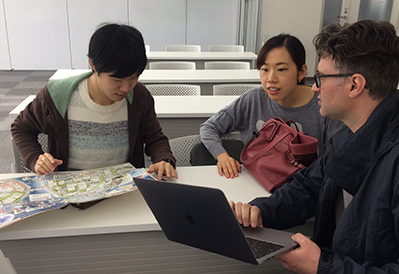
Today, we sat down to review the activities of these past two weeks. What will we, as participants of the Kyoto University International Spring School for Future Global Leaders, take with us in our future careers?
A common thread running through the experiences of the Spring School participants was that the interdisciplinarity of the program has been greatly appreciated. It has truly provided an exchange between disciplines, having some students from philosophical fields, some in international relations, others in business, together with those of a range of other backgrounds as well. Similar variety has been shown in the academic past of the lecturers in the Spring School. Furthermore, the program has provided also a second kind of interdisciplinarity, in that human survivability has been approached as a range of different topics to which these academic fields have then been discussed and analyzed. We have been provided space for practice in Zen-meditation as well as lectures on the survivability of humankind through space travel, and thus been given time to reflect upon these themes and how they may be tackled within our own academic disciplines.
Similarly, even though not in the curriculum of the program, I am confident that the cultural exchanges of these past weeks have influenced the thinking of us participants as we have experienced the different topics. For myself at least, spending time in Kyoto has given me some much-needed space to reflect on how the Japanese, the Swiss – a country where I study – and the Swedes – as which I count myself – approach arising topics because of their cultural backgrounds.
To be a leader in the globalized world means that one often must tackle a variety of issues. Furthermore, if one is a global leader, it is then also important to understand how those issues are valued similarly or differently by people of different origins and concerns. These past weeks have provided me time and space to reflect on how such interdisciplinary and intercultural approaches can be used. After today’s review session, I am sure this is also true for other participants of the Spring School.
Anton Erik Olov Ingstedt
Graduate Institute of International and Development Studies
Spring School Program News Article, 14th March
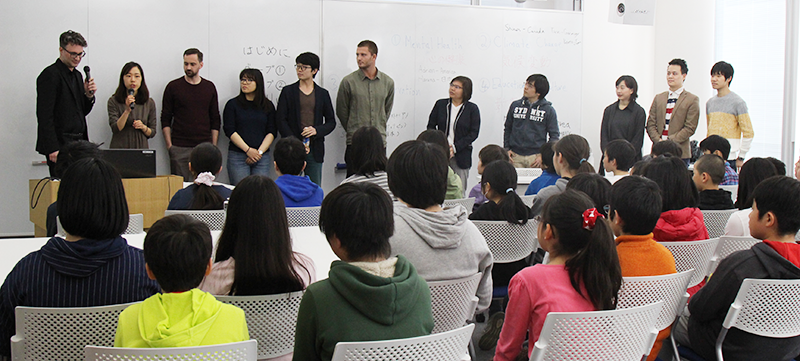
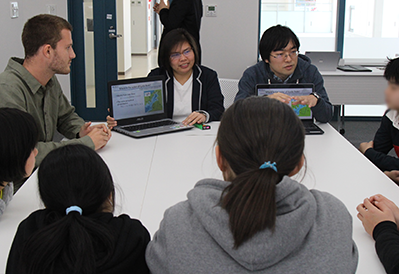
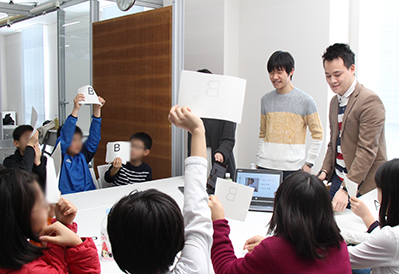
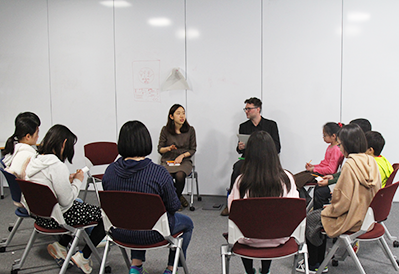
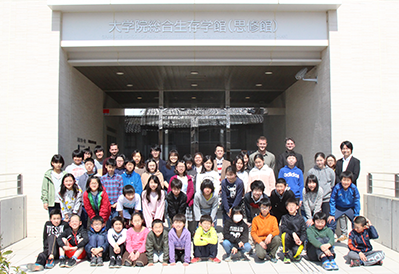
On March 14, 2018, a group of around 40 students from Dai Yon Kin Rin Elementary School attended the workshop created by the fellows of Kyoto University Spring School for Future Global Leaders 2018. The workshop was composed of sub-workshops with primary focus on four issues of global sustainability- mental health, education, climate change, and water conversation.
Dr. Hiroaki Isobe gave his welcome remarks, listened to the workshops of each group, moderated the whole workshop and praised everyone for their contribution. These children, with their spontaneous innocence, expressed their happiness and excitement in immersing and learning with the fellows. In fact, one of the students even asked his teacher when would be the next workshop. Moreover, the school head and the teachers were delighted as fellows gave children tidbits of information, trivia and activities that are socially and academically relevant.
As the national hero of the Philippines, Dr. Jose Rizal, once said, the Youth is the hope of the Fatherland. Hence, it is very important that children are well-informed on their surroundings. This knowledge- sharing activity did not just provide an avenue of communication among fellows, but also emphasized the importance of children in nation- building as they will one day become the generation that will lead this global society and their current actions will shape the course of tomorrow.
The children are right here, on the point of greatness, full with idealism and well-positioned to make the world a better place. Let’s keep on supporting these kinds of activities.
Ma. Josephine Therese Emily G. Teves
Graduate School of Management, Kyoto University
Spring School Program News Article, 13th March
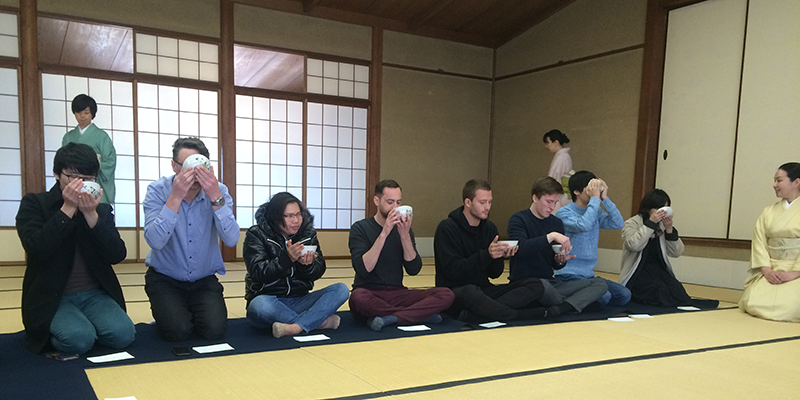
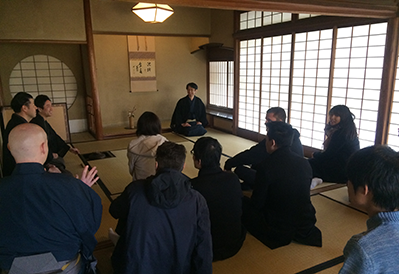
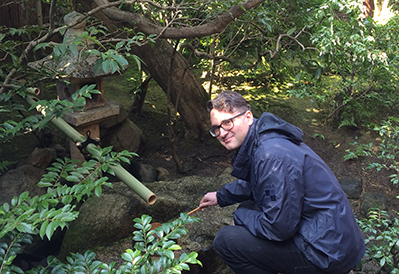
Today, on March 13th, we went to headquarters of Urasenke (裏千家), one of the main schools of Chado (茶道) in Kyoto.
Firstly, 宗榮sensei, who is actually from Canada and has lived in Kyoto over two decades, lectured about ‘what is Chado’, its brief history, etc. with some practice of Chado in front of us. Secondary, we moved to Chado-Kaikan, where people practice Chado. There, we learnt how to purify our body and heart at garden and appreciate the tea ceremony room, especially Tokonoma (床の間), where you can enjoy nice hanging scroll (normally calligraphy, but sometimes picture) and flower arrangement. Next, before we start Chado practice, we saw Chado Demonstration conducted by masters from entering the room with Chado utensils to wrap up. Finally, we experienced making and tasting Matcha (抹茶) by following some proper procedure such as bow and greeting when we drink Cha.
What was interesting thing about lecture done by宗榮sensei was the introduction of four principles written by Rikyu (利休), “Harmony, Respect, Purity, and Tranquility (和敬清寂 )” which shows the ideal situation of Chado. According to his lecture, Harmony between host and guest, guest and guest, host and season, etc. and Respect to host, guest, nature, room, etc are underlying concept of achieving ideal Chado. Purity is the mindset to take a good care of utensils, rooms, people’s heart so that we can concentrate on appreciating good Cha. Through these conceptual shared sense, the space of Tranquility can be achieved. In this sense, Chado is not only making good tea, but also the way of human and natural interaction through good Cha, or even the way of living.
In the practice part, I learn a lot of so-called rules, which have been developed since the last several hundreds years. I found that each detail of procedure include the above-mentioned “Harmony, Respect, Purity, and Tranquility (和敬清寂 )” by appreciation to host, guest, utensil, nature, and so on, and all procedure (even delicious sweets !) are preparation for enjoy Cha nicely in the end. I was so impressed with the fact that tea master has to know or at least feel the right things ranging from temperature of tea to season and nature.
To sum up, I realized that Chado is the significantly deep world based on harmony and delicate appreciation or respect and can be achieved by constant quest of Japanese spirit.
Kento MORIE
Faculty of Integrated Human Studies, Kyoto University
Spring School Program News Article, 12th March
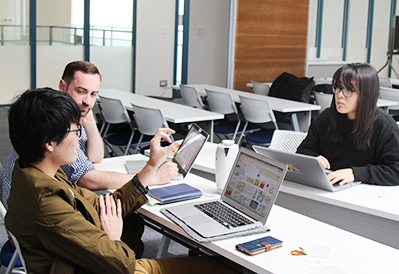
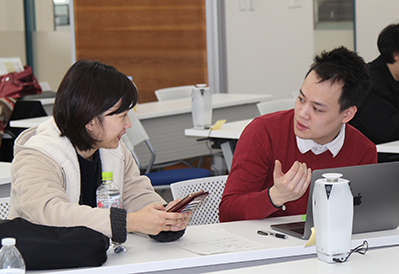
Today, we had a short meeting for our presentations to the elementary school students. We spitted up into 4 groups: mental health, education, climate change, and water conversation, and each group discussed about contents of the presentation. In our team, each brought some ideas, and we combined those into a story of the presentation. The topic of our team is about water conservation. Actually I am studying groundwater, so I am glad to have the chance to tell the importance of water to the children.
Shun YAMAMOTO
GSAIS, Kyoto University
Spring School Program News Article, 11th March
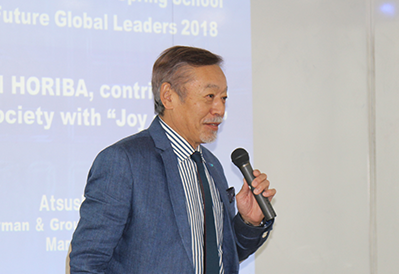
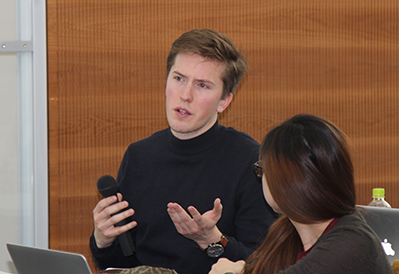
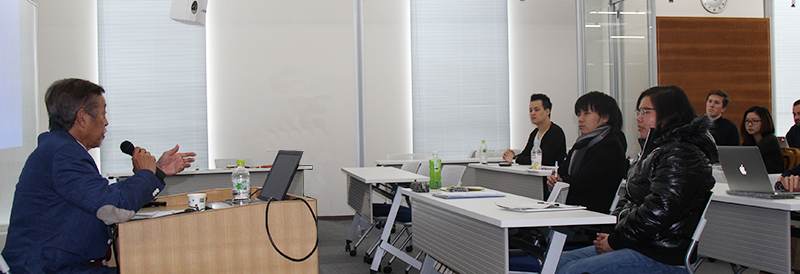
The lecture from Mr. Atsushi Horiba was meaningful to show what the leadership is and how the leader can install his/her philosophy. The rise of Horiba Corporation in Kyoto coincided with a continuous innovation for the quality of technology and a firm founder’s belief that the view of its employees as assets, not costs; with its motto ‘Joy and Fun’ (おもしろおかしく) instilled in, it has successfully been on the upswing in its market.
The motto penetrates not only HR policy but also even its building structure simulating to communicate employees. The emerging global network derived from the tradeoff among societies that Horiba carries out its heritage on the humanity and other communities (or employees from divergent backgrounds) replete with research and technology developed by their way, and that it was to their mutual advantage to integrate people and foster ‘Horibans.’
One of the central aspects shaping the milieu of the philosophy was the brilliant strategy from Mr. Atsushi; ‘Do not put eggs in the same basket’ and ‘M&A based on future feasibility and respect of people.’ In particular, these approaches provided entrenched earning and market shares to support what is the source of executive ability for the ideology. I found it useful to consider whether the aspects of its walk of life in the globalization that resulted in stable operation and empowerment may be incorporated into the role models how the leadership would be when it faces various Beliefs, Norms, and Values.
Hyorim lee
Graduate School of Management, Kyoto University
Spring School Program News Article, 10th March
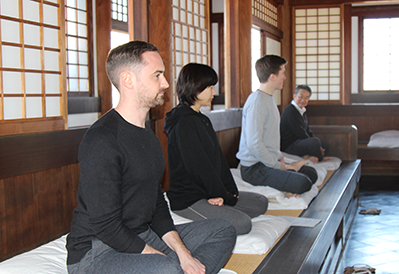
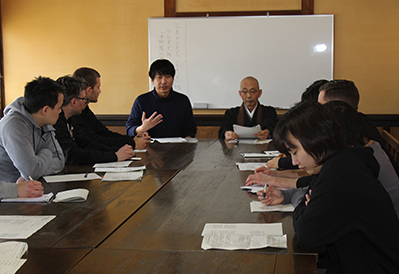
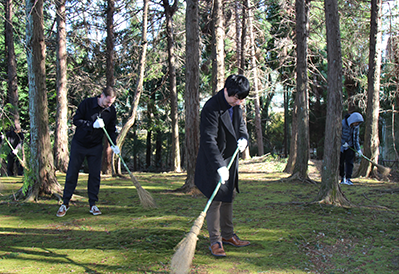
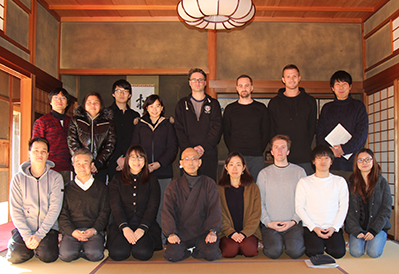
Today we went to Nagaoka Zenjuku in Nagaoka city to explore the world of Zen.
Nagaoka Zenjuku was founded in 1939 and has been a place to learn Zen for university students.
At the beginning, we had a basic lecture about Zen and a concept of “way” in Japanese culture in terms of Zen.
After that, we practiced meditation and tried to come to the status of “emptiness” as we learned in the lecture.
We also did a duty called “Samu” and cleaned the backyard garden. Even during the cleaning, we are supposed not to think and to lose a sense of self.
Before the lecture, Zen was not easily approachable for me. However, I learned that it can be practiced through daily things, including cleaning, walking and sitting.
It was a good takeaway and I would like to keep practicing it in my daily life.
Haruna OMURA
GSAIS, Kyoto University
Spring School Program News Article, 9th March AM
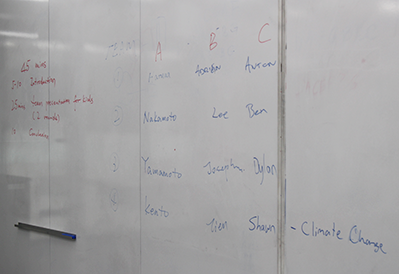
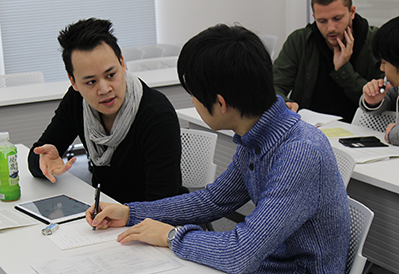
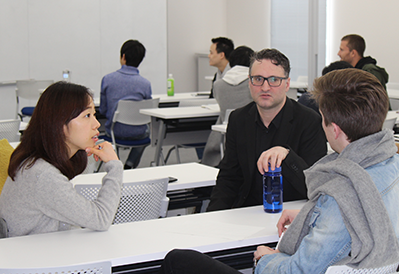
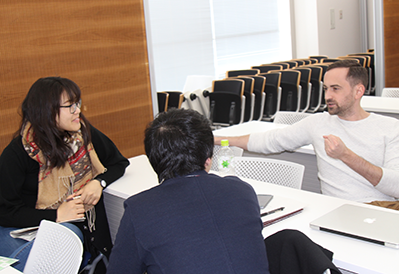
Today, we began our initial preparations for our presentations to an elementary school, which we will be giving on March 14. With the students, we will be discussing four issues of global sustainability – mental health, education, climate change, and water conversation. These four topics fall into two general categories – those that speak to the person (mental health and education), and those that speak to the world (climate change and water conservation). Considering both the personal and the global perspective is important as we try to come up with solutions to global problems.
Shawn Robinson
Johnson Shoyama Graduate School of Public Policy
Spring School Program News Article, 9th March PM
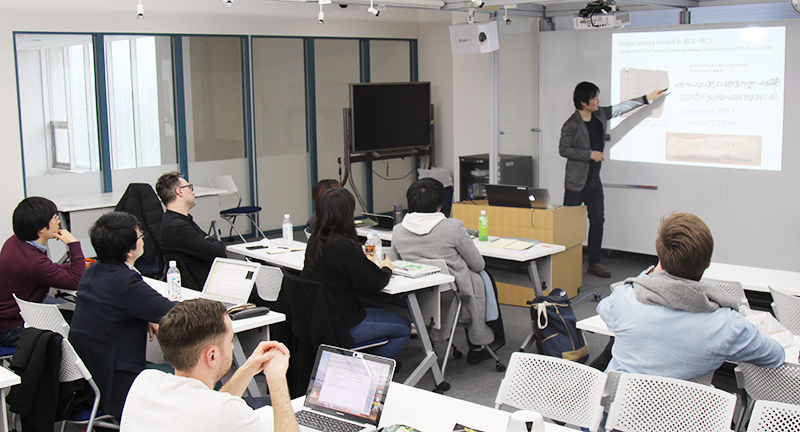
In the afternoon, Adrien Stoloff provided a short presentation on his research. Adrien studies wuwei, or effortless action, as it pertains to Daoism meditation. Adrien was able to demonstrate how wuwei can help leaders in focusing on the job at hand, being able to see issues and potential conflicts, and find solutions to those problems. I felt Adrien’s lecture was a good reminder of how I can approach leadership differently back home in Canada, and that alternative techniques not common in the Western world, like meditation, might help me to become a stronger leader.
Finally, we ended the day with a lecture from Associate Professor Hiroaki Isobe on the dangers of solar flares to modern society, as well as how technological advances may be creating issues that are difficult to control, such as bio-terrorism. The lecture demonstrated how it is difficult to apply additional technology to control these risks, and that traditional mechanisms of international regulation may also fail to provide solutions.
I found this lecture particularly interesting from a governance and public policy point of view. These issues, bio-terroism, genetic engineering, automation, are very difficult problems for government to address from a policy standpoint, with no easy or apparent solutions available. While we were not able to come up with “the answer” to how societies can deal with these problems, the lecture excellently demonstrated that new approaches that delve into social engineering, society construction, and morality will be required, and that legal approaches and regulation may not be sufficient.
Shawn Robinson
Johnson Shoyama Graduate School of Public Policy
Spring School Program News Article, 8th March AM
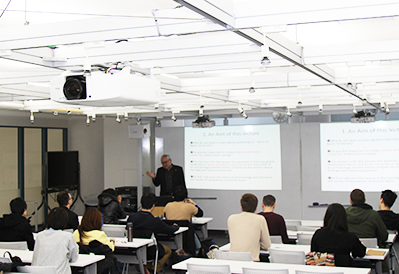
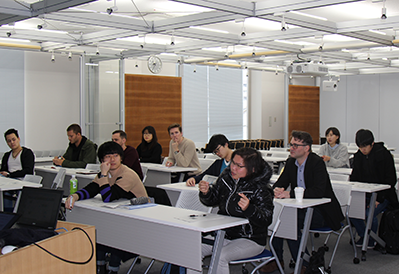
Starting in the morning, a lecture about Kyoto and Kyoto University as global leaders in the field of archaeology was held by Prof. Takura Izumi. Kyoto is one of few cities in the world with the longest history as a capital. Its rich history can be discovered by excavation of overlapping archaeological layers, each representing a different era. To identify the age of the precious artifacts, archaeologists use many methods. For instance, the pottery evolution can be distinguished by color and shapes.
Thuy Tien Nguyen
Graduate School of Engineering, Kyoto University
Spring School Program News Article, 8th March PM
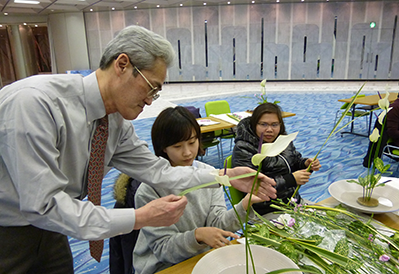
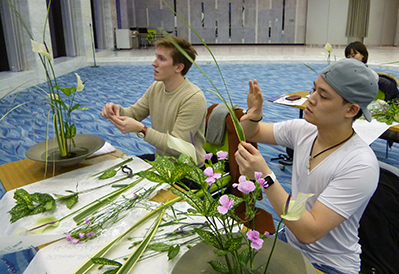
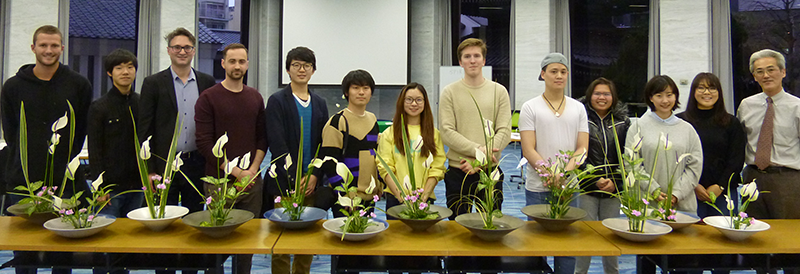
After hearing about Kyoto’s countless treasures, the spring school students went to the downtown area of Kyoto to experience Ikebana, Japanese traditional flower arrangement. At the birthplace of Ikebana, the founding organization Ikenobo gave a tour around the Rokkakudo temple. Followed by the Ikebana museum tour, various flower arrangement paintings, tools and writings could be examined.
Under the guidance of Prof. Manabu Noda, the students had an extraordinary opportunity to practice Ikebana by themselves. As every flower arrangement has a theme, this day’s theme was “family – friendship – team members”. After roughly half an hour, every participant finished their individual composition. A strong recommendation from the professor was to spend time with the plants regularly such as through the interaction with the flowers and the lively discussion about Ikebana with friends, family and colleagues.
Thuy Tien Nguyen
Graduate School of Engineering, Kyoto University
Spring School Program News Article, 7th March AM
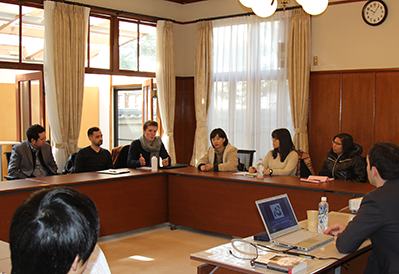
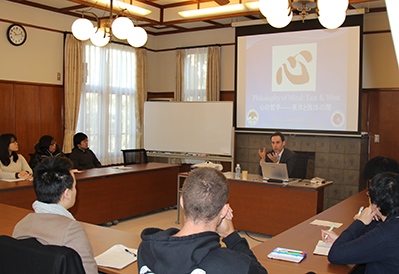
This morning we went to a lecture and short meditation exercise led by Professor Marc-Henri Deroche. The topic of the lecture was “Philosophy of Mind: East & West” or, in Japanese 心の哲学 (kokoro no tetsugaku). Deroche explained the approach of GSAIS of listening, thinking, and application (聞、思、修). Deroche then explained that one of the goals of GSAIS is to rediscover ancient philosophies of East and West, revitalize ancient ideals, and re-actualize the quest for wisdom. He gave us an overview of Western and Eastern philosophies, noting that in both one of the core goals is to ‘know thyself.’ Deroche discussed mindfulness practices and how they are useful to attaining this goal. Finally, we went upstairs to the meditation hall and practices a short meditation technique.
I felt that this was a really good way to give perspective on the concept of leadership. Professor Deroche’s lecture helped to remind us that leading is not just about external factors, but also about one’s own internal disposition. The meditation exercise was also a great introduction to the type of practices and mindset Deroche is advocating.
Adrien Stoloff
Brown University
Spring School Program News Article, 7th March PM
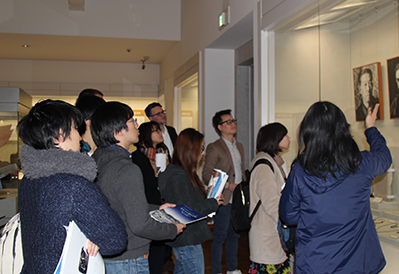
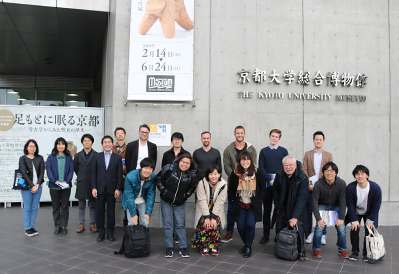
In the afternoon on the second day of spring school, we went to the Kyoto University Museum attached to Kyoto University for observing what the Kyoto University discovered and excavated, and knowing a part of the Kyoto school.
At the Kyoto University Museum, there are numerous specimens, replicas, and real objects as cultural and natural discoveries discovered by the expedition team so far. For each exhibit, the students were very interested in Prof. Izumi, Prof. Motokawa, Associate Prof. Murakami and other assistants, and asked questions and discussed diligently.
After the observation, we conducted free discussions through past lectures and visits. There, discussions were held about the uniqueness of the Kyoto School’s philosophy and field studies, and the leadership that this spring school aims for, and we set issues regarding the importance of each, or their mutual relationship.
We would like to discuss those issues in lectures and experiences of the day.
Ryo TSUCHIDA
GSAIS, Kyoto University
Spring School Program News Article, 6th March
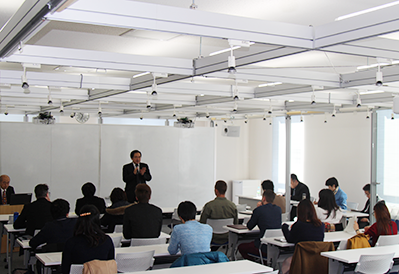
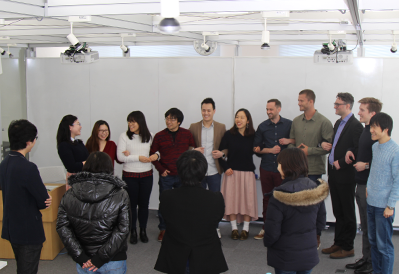
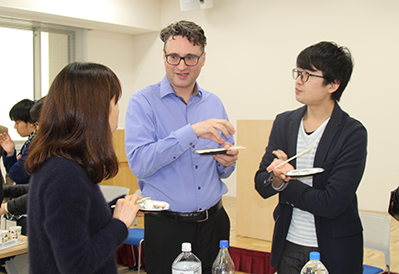
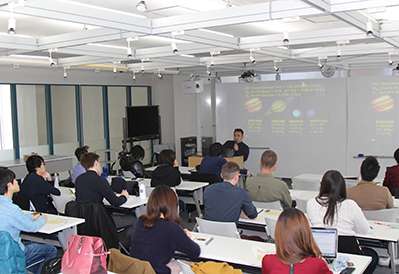
The first day of the Kyoto University International Spring School for Future Global Leaders Program, hosted by the GSAIS, began with an opening ceremony and orientation, in which the programs participants were introduced to the esteemed and distinguished professors responsible for this unique program, as well as a brief introduction to the history of Kyoto University and the purpose of the GSAIS.
Following the opening ceremony, students were invited to introduce themselves to the group and give a brief description of their discipline and field of research. The group then proceeded to engage in a number of ‘icebreaker’ games intending to help the students get to know each other better and building a stronger and more engaged cohort. The students and staff then continued to develop their relationships with each other over lunch provided by the GSAIS.
After lunch, Professor Yousuke Yamashiki gave an engaging and provocative lecture based on the theme of the challenges for the harmonious co-existence of humanity and the global society. Specifically, Professor Yamashiki highlighted the significant difficulties associated with space colonisation and why for the foreseeable future, the survival of the human race depends vitally on the maintenance of Earth’s life supporting functions. Professor Yamashiki’s lecture inspired deep thought and reflection amongst the students and proved an excellent opening lecture for the Kyoto International Spring School for Future Global Leaders Program.
Dylan Thompson
Macquarie University


